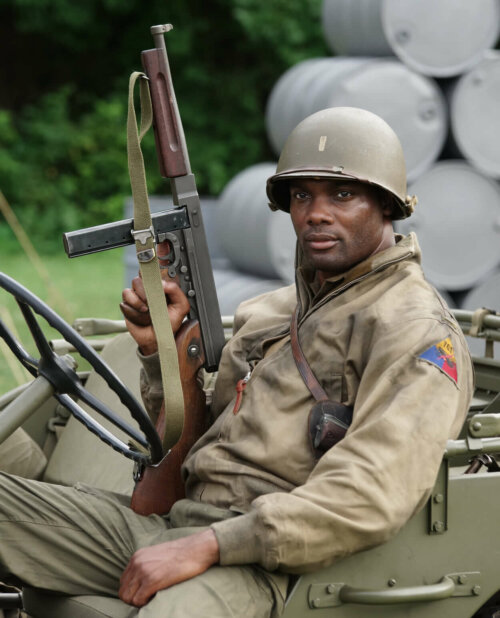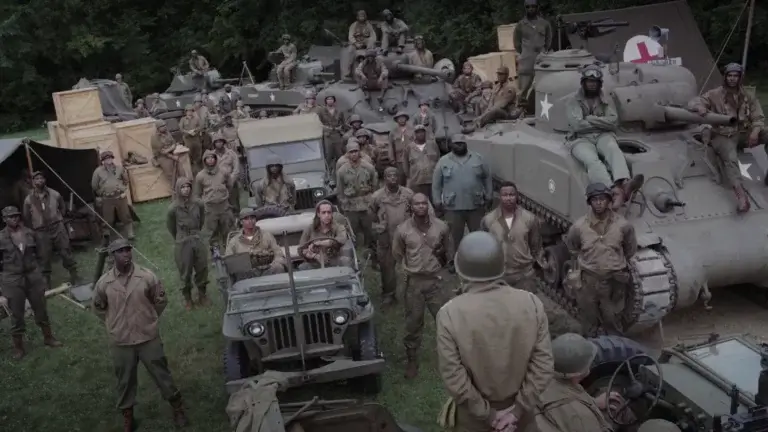My Casting Story: Hiram A. Murray on ‘Come Out Fighting’
Ahead of its theatrical and on-demand release this Friday, we wanted to sit down with one of the stars of Come Out Fighting. Hiram A. Murray took time out to share how he landed his role as Lieutenant Hayes in the upcoming feature that’s based on real events during World War II. Keep reading for a window into how the actor’s longtime working relationship with the writer/director of Come Out Fighting — Luke Schuetzle a.k.a. Steven Luke — led to the opportunity, as well as the lessons that actors can draw from his casting story.
Hiram, thank you so much for being with us today. And before we dive into your casting story, I’d love to hear how you’d sum up your character in the upcoming feature Come Out Fighting.
Thank you very much for having me. In Come Out Fighting, I play Lieutenant Robert Hayes. I am the commander of the famed 761st tank battalion — a.k.a The Black Panthers — which was the first all African American tank battalion during World War II. Without giving away too much of the movie, my character tries to navigate dealing with racism from his superiors on a daily basis while also trying to instill leadership qualities within his men and dealing with the invading army of the Nazis. And Lieutenant Hayes, I would say, has a chip on his shoulder because of the way African American troops were perceived and treated during that time period. So he definitely has something to prove to his superiors, to himself and to his men.
It sounds like a heavy-hitting role.
It is. It’s one that is very near and dear to me because it’s based on true-life events, on the 761st tank battalion. But it’s extra special to me because in my real life, I’m a captain in the United States Marine Corps. And if it wasn’t for these forefathers, there would never have been a Captain Hiram A. Murray. You know, these are the shoulders that I stand on. So when I took on this role, I wanted to do it right and portray these men in a certain light. I wanted to give them their flowers, their respect. I wanted to do my due diligence for them and for the men that they served with.
That’s beautiful. Thank you for sharing that personal connection to the role, and thank you for your service, as well as for your storytelling.
You’re welcome.
 Behind the scenes shot of Hiram A. Murray in ‘Come Out Fighting.’ Photo by David Clobes.
Behind the scenes shot of Hiram A. Murray in ‘Come Out Fighting.’ Photo by David Clobes.Now what can you tell us, Hiram, about the process of booking the role?
This was a gift. So the director of Come Out Fighting, Luke Schuetzle, this is my fourth film with him. Many years ago, back in 2017/2018, I shot a film with Luke called The Great War, and that was my first time meeting him. We had a great experience on the film — he and I bonded. I remember the premiere was in Sioux Falls, South Dakota, and he picked my wife and I up at our hotel. We went to the event, and when we were driving back, he thanked me for giving it my all and really bringing his vision to life. Luke really appreciated that, and he wanted to keep the relationship going — you know, keep the train on the tracks. He told me he had this idea for a movie about the Black Panthers. Luke said, “I’m writing this story, and I have in mind for you to play the commander of the unit. If you’re willing to go on this journey with me, I would greatly appreciate it.” And I was like, “Hell yeah, I’ll go on this journey with you.” So, it took a few years from that point before we actually got started on it. But during that time period, we shot other projects together.
And you know, that’s how everything just fell into place. It was based off of my working relationship with Luke from my very first movie with him, which led to this film. It’s something I always tell actors — it’s all great and dandy when you get the job, but even when you’re on set, you’re still auditioning. The way you carry yourself and perform, people are looking at you and wondering if they can work with you later on in life. And look what happened. I gave my all on that first movie, which led to multiple movies after that. And here we are now with this film.
That’s a beautiful takeaway for actors, and what a dream that you created this relationship with the filmmaker where he then keeps you in mind for future projects. So this was, it sounds like, a long casting story in the sense that the opportunity developed over time. Thank you for sharing that window into the process. And before we wrap, I would love to hear how landing this role on Come Out Fighting has impacted your career so far.
Starring in this film has opened other doors for me, and once again, created more projects for Luke and I down the pipeline. There are other projects that we’re getting ready to start filming within a month [at time of interview]. We have that relationship like how Leonardo DiCaprio and Martin Scorsese are always working together. You know, if it’s not broke, don’t fix it. It’s one of those things where I also tell other actors, “When you come into the industry, find your tribe so that as you grow in your career, they grow, too. Everyone does.” It’s all a table, and there’s enough room for everyone to eat. It’s a potluck. You bring this, they bring that and let’s all eat together.
 Still from ‘Come Out Fighting,’ Courtesy of Hiram A. Murray.
Still from ‘Come Out Fighting,’ Courtesy of Hiram A. Murray.Those interested in keeping up with Murray’s career journey can find him on IMDb, as well as on Instagram, where he frequently posts about his work.
—
This interview has been edited and condensed.
Looking to get your big break? Sign up or login to Casting Networks and land your next acting role today!
You may also like:
- 3 Things Actors Should Do Now to Financially Survive the Writers’ Strike
- How Do You Respond to Negative Feedback and Rejection?
- Casting Director Nina Gold on ‘Slow Horses’




